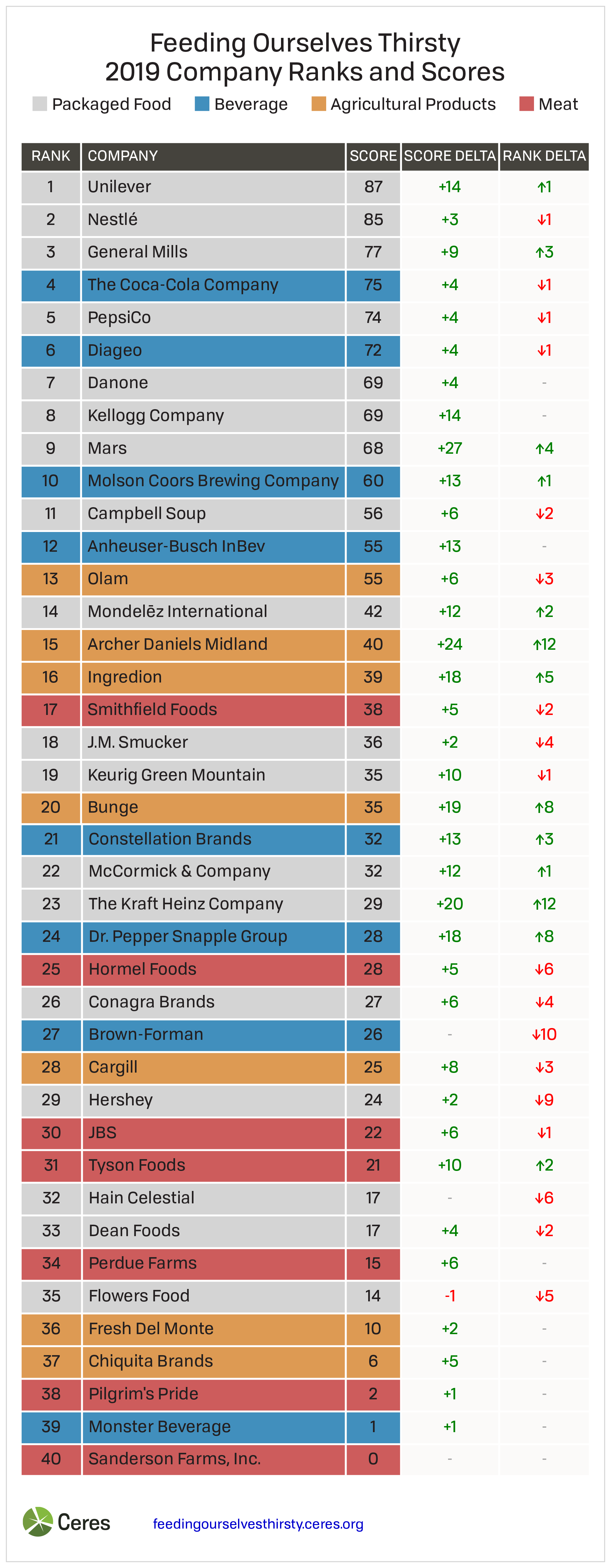Corporations ‘should rethink’ how they treat freshwater
 17 November 2019
17 November 2019
Water is a precious resource threatened by environmental change. Corporations across the globe are learning to use it more sustainably; however, according to a new report, they should be doing a better job.
Published for the third time since 2015 by sustainability nonprofit Ceres, the Feeding Ourselves Thirsty report looks into water management practices of global corporate food giants. And with the food industry using 70% of global freshwater, this is not only about the environment. Close to $415 billion in revenue are at risk due to water scarcity and an estimated $248 billion are at risk from shifts in precipitation.
The report builds on existing company disclosures, annual reports and official responses to CDP inquiries to rank 40 global corporations in the food sector on their water performance. It considers strategic choices, supply chains, manufacturing practices, commitments, risk assessments and more for a holistic picture. The report’s website works as an interactive database featuring best practices, the performance of individual companies and regional analytics.
Evaluated by four categories, the companies were scored on a scale of 1 to 100 and evaluated in comparison to their performance in previous years. The top five are Unilever, Nestle, General Mills, Coca-Cola, and PepsiCo.
The companies were also evaluated in terms of the progress they have made over the years. Overall, 37 out of the 40 companies surveyed have improved their score. However, the rate of progress has often been negligible. The average performance across the industry is insufficient compared to the severity of water challenges we are facing, according to the authors.

There are some great practices to learn from, too. Mars has improved its performance by 27 points thanks to its “Sustainable in a Generation” plan emphasizing company-wide transition to sustainability. It plans to reduce its water use by 50% by 2025 as compared to 2015. Archer Daniels Midland, Ingredion, Bunge, Dr. Pepper Snapple Group and the Kraft Heinz company have showed similar rates of progress.
Ingredion uses advanced third-party analytics and assessments to identify and mitigate water-related risks across multiple regions, while integrating IPCC scenarios into its sourcing strategies. General Mills does comprehensive assessments using WWF-DEG Water Risk Filter, WBCSD’s Global Water Tool and other aids to address regulatory risks and consider a variety of stakeholder perspectives.
Meanwhile, Archer Daniels Midland provides incentives to farmers adopting sustainable agricultural practices as well as monitoring soil health and water quality. These and many other featured examples suggest that even large companies can transform quickly with top-level commitment and thanks to innovations in manufacturing and supply chains.
Brooke Barton, the co-author of Feeding Ourselves Thirsty, observes that “[g]rowing and processing the food we eat is a thirsty business, consuming more than 70 percent of the world’s increasingly strained water resources”. He says he is concerned about the still negligence of many companies despite some great progress made by others.
The authors suggest that the industry needs to adopt more ambitious commitments. The average score of the 40 largest companies is 38 out of 100, although over three-fourths of companies acknowledge that water scarcity is a risk factor in their operations. Great progress needs to be made in assessing water risks, introducing sustainable water sourcing and linking water use with sustainable agriculture practices.
The report serves as a unique benchmarking tool for investors to assess the environmental risk profiles of companies. Building on a significant evidence base, it sends a powerful message to the corporate world: managing water effectively is crucial for every food company that wants to succeed in future.
The post Corporations ‘should rethink’ how they treat freshwater appeared first on Sustainability Times.
